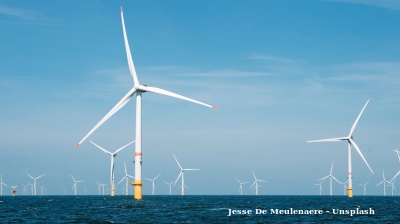Nearly 75% of people surveyed across the European Union acknowledge the necessity of adjusting their lifestyles in response to climate change, as revealed by the European Investment Bank's annual Climate Survey. When asked about their countries' pressing issues, participants placed climate change as the second most significant concern, just behind the rising cost of living.
However, there were stark differences across the 27-member bloc, with a much lower share of respondents in Central Europe saying that adapting to climate change is a national priority.
The lowest numbers were in the Baltic states, Finland and Poland, with just 16% of respondents in Estonia citing climate change as a priority.
By contrast, over 60% of respondents in southern European countries such as Greece, Italy, Portugal and Spain said climate change was a priority. Among the newer member states in the eastern part of the bloc, the highest share of people naming it as a priority was in Romania (59%) and Bulgaria (50%).
Conducted in August 2024, the survey included responses from over 24,000 people. According to the EIB, 94% of respondents in the EU agreed that it was important for their country to take action to adapt to climate change. However, only 50% considered this a top priority.
Climate-related disasters increase
As the number and severity of extreme weather related disasters increases, the EIB report pointed to the economic implications of climate inaction. Nadia Calviño, the EIB president, highlighted how recent extreme weather events demonstrated the high cost of ignoring the climate crisis.
“This year we have seen the tragic impact of extreme weather events in Central Europe and, most recently, in my own country, Spain, where many have lost their lives and thousands have been made homeless,” Calviño said.
“From Pakistan to the Caribbean and North Carolina, the impact of climate change is being felt across the globe. The survey confirms that people know we must act now to adapt to and mitigate the effects of climate change. An orderly transition also makes the most economic sense. Every €1 invested in prevention and resilience saves between €5 and €7 in repairing damage.”
The survey found that 85% of respondents across the EU believed that investing in climate adaptation now could prevent higher costs in the future, and 86% said such investments could create jobs and boost local economies. However, despite this recognition, practical support for adaptation efforts remains unevenly distributed.
Southern Europe suffers
Southern Europe has been hit hardest by extreme weather events in recent years, including record-breaking heatwaves, devastating wildfires and prolonged droughts. These experiences appear to have shaped public opinion, with a majority of respondents in the region expressing a strong sense of urgency about the need for adaptation.
In Spain and Romania, more than 70% of people reported experiencing extreme heatwaves in the past five years. Romania has also been struck by flooding. Between September 14 and 16, 2024, Storm Boris brought severe flooding to Romania, heavily impacting on the counties of Galați and Vaslui. The disaster caused significant devastation, claiming at least seven lives, forcing thousands to evacuate and damaging approximately 6,000 homes.
“Adapting to climate change is not just a necessity for Romania – it is a strategic investment in the country’s future,” said EIB vice-president Ioannis Tsakiris.
In Greece, which has seen repeated wildfires devastate homes and natural landscapes, 61% of respondents said they might need to relocate to escape future climate impacts. Similarly high numbers were recorded in Romania, Bulgaria and Spain, where around half of respondents believed that they might need to move to cooler or less climate-vulnerable regions.

In contrast, respondents in Central and Eastern Europe ranked climate change lower among national concerns, trailing behind issues like the rising cost of living, unemployment and political instability. This is despite climate-related disasters, notably the widespread flooding that affected large parts of the region this autumn.
Poland, for instance, experienced severe flooding in September, described as the heaviest rainfall ever recorded in the region. The disaster affected nearly 2mn people, caused 24 deaths and prompted the government to declare a state of emergency. Despite such events, only a minority of Poles viewed climate adaptation as a priority, reflecting the broader trend in the region.
EIB vice-president Teresa Czerwińska acknowledged the challenges posed by this perception gap. “The devastation wrought by extreme weather events in Poland serves as a tragic example of the growing costs of climate change,” she said. “We must ensure that investments in climate adaptation are seen not only as necessary but as opportunities to create jobs and strengthen economies.”
Better communication needed
The survey highlighted a critical need for better communication and financial assistance to support climate adaptation efforts. While 71% of Europeans felt informed about how to adapt their homes and lifestyles, a majority – 60% – were unaware of public subsidies or financial incentives that could help them implement changes. The lack of awareness was particularly acute in Central and Eastern Europe, where governments have been slower to roll out comprehensive climate adaptation policies.
To address this gap, respondents across the EU pointed to several key priorities for local adaptation efforts. Many stressed the importance of cooling urban areas, improving infrastructure such as drainage systems and flood barriers, and educating the public on effective responses to extreme weather.
However, opinions diverged on who should bear the cost. While 35% believed that companies most responsible for climate change should pay, 32% argued that the costs should be shared equally, and 15% suggested higher taxes on wealthier individuals.
Beyond their own borders, a majority of Europeans recognised the need to support global adaptation efforts. According to the survey, 57% believed their countries should do more to help vulnerable nations adapt to the growing impact of climate change.
bneGREEN

Singapore’s green pivot – headline grabbing but still limited
Forays into offshore wind via regional cooperation with neighbours, and forward-looking bets on hydrogen and low-carbon fuels are making headlines, but the scale required to wean a heavily gas-dependent system off fossil fuels is still daunting.

North Macedonia's Skopje tackles mounting waste and rodent crisis
Locals say the problems in Skopje's Centar municipality worsened during the local election period when political campaigning took precedence over maintenance.

Malaysia–Vietnam offshore wind project to deliver 2,000 MW by 2034, strengthening regional green energy links
Malaysia’s upcoming offshore wind project connecting Vietnam to Peninsular Malaysia is expected to generate up to 2,000 megawatts (MW) of clean energy by 2034, marking a major step in the nation’s renewable energy expansion

EBRD invests €16.8mn in Croatia’s first large-scale battery storage and virtual power plant
Development bank to take its first equity stake in a standalone merchant storage project.




